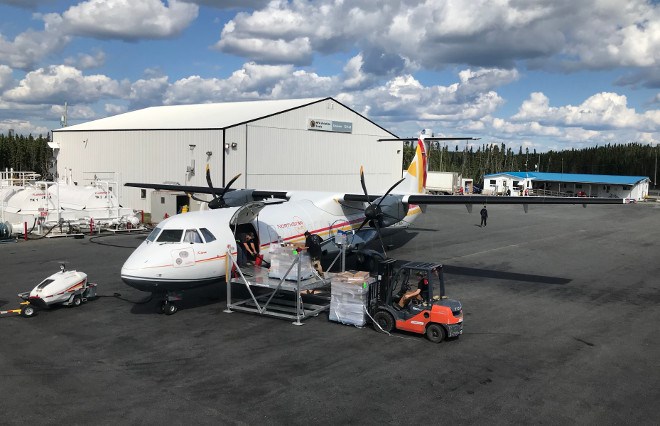North Star Air has been building relationships with both mining companies and the remote communities of the Far North for years, striking a balance between commerce and supporting Northern culture.
The company is more than freight and charter service. In many cases, it’s a lifeline for those communities.
North Star Air serves more than 50 communities with a fleet of 16 aircraft and around 180 employees and is growing every day.
While known for its passenger service, the company has been providing safe and reliable air cargo and charter service for the mining industry for years.
“We can get into places a lot of the larger companies can't because we are equipped to fly into remote locations and have decades of experience hauling cargo,” said Jeff Stout, operations control manager. “Our planes are designed to take off and land in pretty remote areas, off runway, and on ice and water.”
There are several large and long-running mines in the area, like Victor and Musselwhite. North Star Air works more with smaller junior mining companies, delivering bulk fuel and hauling food, drill rigs, and construction material.
Along with flight charters and cargo, North Star also offers logistics services in the design of ice landing strips, based on the terrain, the parameters of the aircraft, and the weather conditions.
Decades of experience in remote areas means the company understands the terrain and the environmental variables of working in remote areas.
Along with cargo, people have to be moved into these camps. North Star has a fleet of PC-12 aircraft and a nine-seater that can handle ice runways and other specialized flying needs.
“We are uniquely positioned to help a lot of these mining companies, because where the airline industry is going, if you want big equipment, you need a big airline,” Stout said. “We have that, but we are still small and flexible enough we can be flexible with things like ice strips and off-runway.”
The mining companies also need a safety management system for every project. North Star Air has two people dedicated to just that aspect.
There hasn't been a big ramp-up in the demand for air services yet, but Stout said with the Ring of Fire looming, he can see it coming, and the company is preparing for when the mine projects are finally underway.
North Star is getting into bigger passenger aircraft, facilitating exploration and expanding past Ontario's borders. The company currently operates in Manitoba and Nunavut and has recently extended its range into the Northwest Territories.
The company started in 1997 with two Beaver aircraft single engines with floaters in Pickle Lake. In co-operation with Canoe Frontier, its sister company, North Star Air flew fishers and paddlers seeking adventure in Northern Ontario.
By the early 2000s, Stout said the company was supporting a lot of the mining activity in the area, hauling drums in to the summer exploration camps into places like the Ring of Fire.
The biggest change came when Frank Kelner joined the team in 2012, bringing more than 40 years of aviation experience and an ambitious expansion plan. At the same, time Cargo North was created, providing big aircraft like the DC-3.
“We quickly went from being a side player hauling oil drums to being a mainstay in the communities,” Stout said.
In 2013, North Star entered into a revenue-sharing agreement with Muskrat Dam and Sachigo Lake First Nations. That same year, Cargo North added a second Basler BT-67 aircraft.
In 2014, North Star Air relocated its headquarters from Pickle Lake to Thunder Bay to facilitate its growth. Cat Lake, Deer Lake, Kashechewan, Neskantaga, and North Caribou Lake partnered with North Star Air through revenue-sharing agreements.
A base was also opened in Red Lake to better service its new strategic partners, Deer Lake and Cat Lake.
In 2015, Bearskin Lake, Poplar Hill and Webequie joined the North Star Air team communities.
North West Company acquired North Star Air in 2017.
Serving communities goes beyond freight and charter service. North Star Air's profit-sharing agreement has given back more than $3 million to its partner communities.
North Star Air actively hires and recruits in the Far North, and the company sees itself as a nurturer of the Northern economy, providing careers and training for residents.
“We reach out to the First Nations and remote communities to show them they can have a future with us,” Stout said. “Our staff live and work in these places. They can fly from major hubs and stay in the communities where they have family.”
In addition, employees get hands-on experience working in places that Stout said they wouldn't get at a major airline. All pilots learn to work in remote locations and rugged conditions.
“We are helping to enrich aviation as a whole, training pilots to work under some pretty extreme conditions and acquire knowledge about different conditions,” he said.
North Star Air reaches out at career fairs and school presentations, showing students they can have a future in aviation, from administration roles to being pilots.
North Star Air offers stable jobs and what Stout called “better than average” salaries and working conditions, including plenty of downtime for pilots to rest.
North Star Air also works with the Ontario Society of the Prevention of Cruelty to Animals, removing stray and unwanted dogs and cats from remote communities and flying them south where they have a better chance of being adopted in a larger urban centre.
The Drift magazine, a new publication from Northern Ontario Business, features profiles on the people and companies making important contributions to the Northern Ontario mining service and supply industry.




